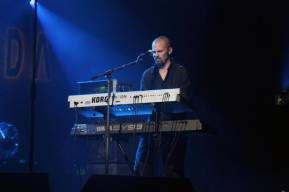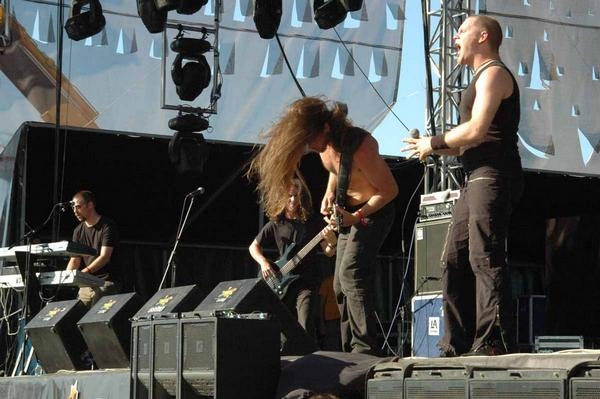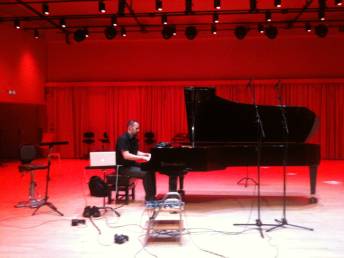Songwriting Interview With Martin Hedin

Ryan Buckner: Hi, this is Ryan Buckner from SongwritingLessonsOnline.com, and today I am on the phone with Martin Hedin. Martin is a songwriter and keyboard player for the progressive metal band Andromeda, who since 2001 has released 5 full length albums, toured throughout Europe and played in the annual ProgPower Festival in the US. Additionally Martin and the music he has contributed through his band have had a major influence on me as a songwriter. So I’m very glad to have him here with me today for this interview. How are you doing today Martin?
Martin Hedin: I’m just fine thanks. Thanks for having me.
RB: The pleasure is all mine.
RB: Alright so let’s go ahead and get into it. My first question to you is this: When did you first start writing songs and what inspired you to do so?
MH: Oh wow it was really early. I started to play piano when I was 4 years old and I guess I started to write stuff maybe at 6 or something. It’s not like those songs were any good but I liked creating I didn’t want to just play the things in the books, I wanted to do my own stuff. So it’s been a gradual process since then.
RB: That said, how many songs do you think it took you to write before you felt like you were satisfied with the music you were making?
MH: How many? I don’t have a number. I pretty much played all the time when I was a kid growing up. So I guess a lot. It was when I was in high school that I started to play in bands and stuff then I started to write songs that were ok.
RB: Would you say that by the time you were in Andromeda that you were pretty confident in your songwriting skills?
MH: Yeah sure. That was way later so I am pretty satisfied with what we’ve done, even the early stuff. You always develop. I would do things differently now than we did on our first and second album perhaps, but I still think there’s pretty good stuff there.
RB: I’m kind of curious about that, what kind of different stuff do you think you might do?
MH: I don’t know. I have a different perspective now. If your everyday life is full of music then you develop somehow all the time. I’m just more experienced now.
RB: After releasing 5 albums over about 12 years, your band has really come to develop its own distinct sound. Whenever you sit down to write music, do you find yourself trying to find a balance between what you want to write and what your fans expect?
MH: I don’t think I ever write things at least consciously that are supposed to suit the fans or anybody. Of course you think a little bit about what will suit the band. I know how Johan wants to play stuff and Thomas as well [guitarist and drummer respectively in Andromeda]. So you have in the back of my head like “yeah they can play that or try that and that’ll probably work”. You get that kind of feeling. I don’t think I write to please the fans in that way. I just want us to do stuff we haven’t done before. Not that we are always progressive. We can do pretty commercial stuff in between the proggy stuff. Anyway it has to be interesting to us, something that is new to us in everything we do.

RB: You mention that you think in your mind of what the other players in the band are going to be playing too while you are writing. What do you think are the pros and cons to writing in a band versus on your own, your own thing?
MH: When I’m writing just for me. I’m working on an album right now actually. The difference is you don’t have to compromise. You feel very free in that way, but it is also limiting in one way. When we write in the band I might write a whole song but then when I show up with it in the rehearsal room and Johan does something and gets an idea from that… it goes back and forth. It evolves in a way that it never would’ve done if I did it myself. You completely miss out on that when you work on your own. They’re both good ways to work. I’m glad that I have the privilege to do both and to work with such talented musicians in the band. That’s really a blessing or something.
RB: Yeah you get all these external ideas and that makes it that much easier to write great stuff.
MH: Yeah.
RB: How much time do you think you spend planning out your songs ahead of time versus improvising in the moment?
MH: I can only speak for myself, but I think I rarely improvise. It’s very much planned. I spend a lot of time twisting all of my ideas and rejecting. I do that all the time. I’m really my own worst critic. I throw out a lot of ideas. There is a pretty… what is that called… like a filter. I can’t find the word right now…
RB: …Like a standard. You have a standard for yourself.
MH: Yeah, I get a lot of ideas and work on them for a while. If it doesn’t feel special to me after a few days I throw away or twist it into something else. It’s a very long process. Some of the songs that we’ve done have been years in the making really. All of us wrote music before we even started to play together. Actually some of the stuff is much earlier than the band. Especially in the second album I think.
RB: When you plan stuff ahead of time do you go off of an idea you want to express, such as a concept and say to yourself “How can I make this into music?” Is that something along the lines of what you do?
MH: Yeah sure, that is one way. I am constantly doing things differently. It evolves all the time… the way I write. That is one way, to consciously think of the lyrics first and let the music follow that. It can also just evolve instantly sometimes but that is very rare. Get the whole idea in a day or something. That’s very rare. I like working in different ways because you get a very different result if you start with the lyrics and do the music later or you do it the other way around.
RB: What do you think is your favorite topic to write about?
MH: Lyric-wise? Our last record was really political. I don’t know if I like it, it’s like I am really angry about stuff that goes on in the world right now.
RB: It feels important right?
MH: Yeah, I felt that I had to get it out of my system somehow. It’s pretty straightforward, the lyrical theme on Manifest Tyranny. You don’t have to guess what I mean.
RB: Right, you don’t have to “read between the lines”.
MH: Exactly. I also like to write… what is that called? I can’t speak English today, sorry [laughs]
RB: I struggle with it at times as well.
MH: [laughs] Anyway I like to use metaphors and make it really complicated and hard to get. I like that too, but it just suited the theme better. The theme was better off being more face value.
RB: There’s definitely value in putting it right out there directly.
MH: It’s like a protest album. It’s really like a soundtrack to a revolution. [laughs]
RB: I really like it. I like the lyrics a lot on that album.
MH: Thanks. Not all Americans do.
RB: That’s for sure.
RB: Do you ever have a hard time coming up with ideas? And if you do, how do you solve that problem?
MH: Yeah I have that often. Sometimes I have a whole day, time where the kids are not here. “Now I can really work on something.” …and then I get stuck and it’s really frustrating. But what can you do, if you don’t have the inspiration you can force it. So I just do something else. Then of course you get inspiration when you don’t have the time so you try to scribble ideas down wherever you are. I use my phone a lot to record, just humming into the phone when I have an idea.
RB: Yeah that’s a great idea.
MH: If I have more time I can just go through those ideas and if I still like those ideas I might do something with them. I’ve always done it like that even before the technology got so easy. It’s such a good tool. I did it with just pen and paper before.
RB: I used to do that too. Actually I remember back when I was in high school I would just write it down in class… when you’re supposed to be working right?
MH: Yeah exactly. [laughs]
RB: Do you ever have a lot of music that goes unused?
MH: A lot. Whole songs that I’ve worked a lot with but then somehow they don’t cut it or fit the band. I have a lot of songs that are unpublished but that will be published one day hopefully. I write a lot in different styles. A lot of it wouldn’t fit Andromeda. The album that I’m working on now is more like prog rock not prog metal. My influences in Andromeda are more to the soft side. I listen more to Genesis, Pink Floyd, you know the old 70’s stuff. That meets Thomas and Johan’s Pantera and Metallica influences. It’s a really good thing, you get interesting results with that. Not everything I write would fit the band I think.

RB: As someone who writes progressive style music I’m sure you’ve spent a lot of time learning about music theory. What would you say is the importance of learning music theory when it comes to songwriting?
MH: It’s really important. It’s not actually completely necessary but it’s really useful. It’s as important to break the rules as it is to follow them. But you have to know when to do what. You can really hear that if someone has cool ideas but can’t find the right chord in some places or whatever. It really helps you to have a great understanding about harmony. But also to break the rules… because then you know you can break the rules like “this” but if I break them like “this” I sound like an amateur. It really helps to know a lot about music theory. Some of the stuff like metric modulations when you have a 16th going with the pulse on every fourth 16th and then you change it to every third. That’s like a math way to transition to another part. You could never just come up with that. You have to know your theory to do things like that.
RB: So would you say there is a part of it that comes with just ‘feeling’ it and there’s a part where you have to have theory to actually get those ideas that you would never…
MH: Yeah. I think most of the time, the spark, the first idea just comes from somewhere. It doesn’t have to do with anything conscious. It probably comes from something you heard and then you get an idea and like it or whatever. When you arrange it or work with it, then you have to really know your theory because otherwise you might mess things up. That’s how I feel. It’s like grammar, you can have a really great story for a book; but you have to write it in the correct way.
RB: Here is my last question for today. What advice would you give to anyone who is looking to make it in the music business?
MH: Think hard about it before you get into this business [laughs]. A lot of people are into creating music now a days. I think it’s great and it would be even greater if people actually could make a living out of it, which very few people can. It’s really important to be aware that you can’t just write a really great song and then you’ll get famous and rich. The song could be great, but you really have to have the luck or connections or whatever it takes. We’re still struggling so I guess just, keep it real.
RB: Cool. And on that note, I just want to thank you for taking the time to share your insights on songwriting with me. I’ve been a fan of Andromeda for years so it’s been a real treat for me to sit here and chat with you.
MH: Cool. Yeah sure.